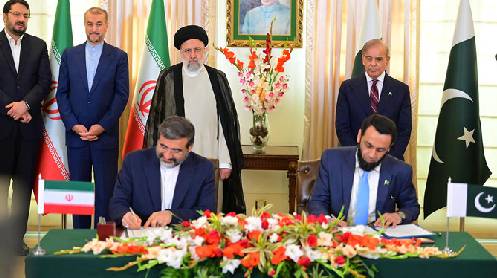During President Ebrahim Raisi’s visit to Pakistan, both countries emphasized enhancing economic cooperation and addressing regional challenges. The visit resulted in a joint statement outlining key areas of collaboration and mutual understanding.
One significant outcome is the commitment to expedite the Free Trade Agreement (FTA) between Pakistan and Iran, highlighting the importance of economic integration and trade facilitation. Additionally, cooperation in the energy sector, including trade in electricity, power transmission lines, and the IP gas pipeline project, was reaffirmed, underscoring the shared interest in energy security and sustainability.
Furthermore, both nations expressed the need to transform their common border into a zone of prosperity, focusing on joint development projects, border markets, and economic free zones. This vision aligns with efforts to promote socioeconomic development in border provinces, such as Iran’s Sistan-Baluchistan and Pakistan’s Balochistan.
The joint statement also addressed regional issues, including the resolution of the Kashmir dispute through dialogue and peaceful means, in accordance with international law and the aspirations of the Kashmiri people. Both countries condemned terrorism in all its forms and emphasized cooperation on counter-terrorism measures.
Moreover, Pakistan and Iran reaffirmed their commitment to regional stability, particularly in Afghanistan, and expressed readiness to combat terrorist threats collectively. They also condemned Israeli aggression against Palestinians and called for international efforts to address the humanitarian crisis in Gaza.
As members of the Belt and Road Initiative (BRI) and the Economic Cooperation Organization (ECO), Pakistan and Iran pledged to enhance connectivity, infrastructure development, and energy cooperation. The expansion of linkages between the ports of Gwadar and Chabahar signifies their dedication to regional connectivity and economic integration.
Overall, the visit and joint statement reflect a shared commitment to strengthening bilateral ties, fostering economic growth, and promoting stability in the region.






